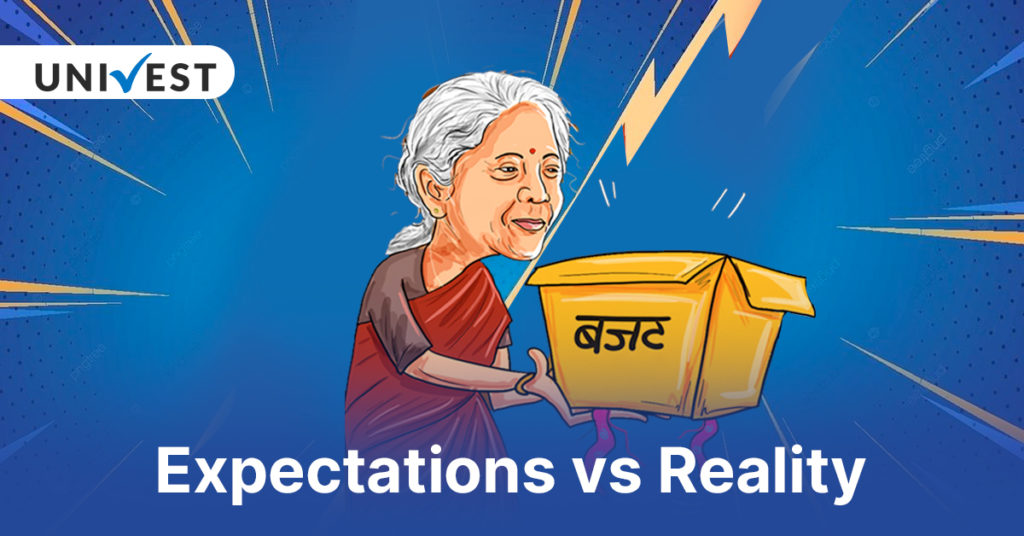
Union Budget 2025 Highlights: Will the Middle Class Get Relief? Budget Estimates and Economic Impact
Posted by : sachet | Mon Feb 03 2025

Union Budget 2025 Today: Finance Minister gave more than expected benefits to middle class………. | Discover more about the budget highlights and tax rebates below
The long wait for the Union Budget 2025 has come to an end with the conclusive speech of the 2nd full budget of the Modi Government. FM Nirmala Sithraman ended her budget 2025 presentation around 12:16 PM in the Lok Sabha on 1st February 2025.
At the end of the budget speech, the Finance Minister gave a gift of a huge tax rebate in the direct tax slabs for the middle-class segment of the Indian taxpayer pool. Now, normal income up to 12 Lac other than special rate income such as capital gain under the new tax regime is completely exempt from taxes. This means that the salaried individual earning an income of up to 12 lacs may have to pay 0 taxes; this rebate was previously available up to level 7 Lac only. However, detailed information about the new income tax announcement is yet to come after 1 week after the budget.
While continuing her speech, the Finance Minister also spoke about key changes in the income tax slabs under the new regime. To know about the new tax slabs, please refer to the below table:
Tax Slabs In New Regime
| Income Slabs (₹) | Tax Rate (%) |
| 0 – 4 Lakh | NIl |
| 4 – 8 Lakh | 5 |
| 8 – 12 Lakh | 10 |
| 12 – 16 Lakh | 15 |
| 16 – 20 Lakh | 20 |
| 20 – 24 Lakh | 25 |
| Above 24 Lakh | 30 |
Other Key Highlights Of The Union Budget 2025
- The FDI limit for insurance companies that invest will invest their complete premiums in India is increased from 74% to 100%.
- A new fund of funds will be set up for AIFs for startups with a fresh contribution of 10,000 crores.
- A term loan policy will be introduced for first-time women entrepreneurs under the SC/ST category. Under this term loan, up to 2 crores will be provided over the next five years.
- The tax threshold limit for Senior citizens is increased to Rs. 1,00,000.
- The turnover limit for MSMEs will be increased by up to 2.5 times.
- 20,000 crore is allocated for nuclear energy mission R&D and reactors.
- 36 life-saving drugs and medicines are added to the list of medicines fully exempt from basic customs duties.
- Another 6 life-saving medicines will be added to the list of medicines attracting concessional duties @5%.
Fiscal Policy Highlights of the Union Budget 2025
Smt. Nirmala Sithraman began the Fiscal Policy with reference to the mention of her previous promise in the July budget 2024. She said, “In the July budget, I have committed to staying the course for fiscal consolidation. Our endeavour will be to keep the fiscal deficit each year such that central government debt remains on the declining path as a percentage of the GDP.” Please read the following points to learn about the key changes in India’s fiscal policy introduced in the Union budget 2025 – 26:
Revised budget estimates for the fiscal year 2024-25:
Total Receipts (other than borrowings) – 31.47 lakh crore
Net tax receipts – 25.57 lakh crores
Total expenditure – 47.16 lakh crores
Capital expenditure – 10.18 lakh crores
Revised Fiscal deficit – 4.8% of GDP
Budget estimates for the fiscal year 2025 -26:
Total Receipts (other than borrowings) – 34.96 lakh crore
Net tax receipts – 28.37 lakh crores
Total expenditure – 50.65 lakh crores
Revised Fiscal deficit – 4.4% of GDP

Union Budget 2025: A Comparison With Budget 2024. What Changed In The Union Budget 2025?
Snapshots of Union budget 2024:
- The Union Budget 2024 focused on youth skilling, MSMEs, and the middle class.
- The union budget 2024 prioritised 9 key pillars:
- Productivity and Resilience in Agriculture
- Employment & Skilling
- Inclusive Human Resource Development and Social Justice
- Manufacturing & Services
- Urban Development
- Energy Security
- Infrastructure
- Innovation, Research & Development and
- Next Generation Reforms
- The budget mentioned India’s inflation to be low and heading towards the 4 per cent target.
- There was a projection that 1 crore farmers would move into natural farming in the future.
- The budget allocated 3 lakh crores to promote women’s development.
- There was a proposal to increase the mudra loan amount to Rs 20 lakhs from the current 10 lakhs.
- A relief to the taxpayer was provided in the form of a hiked standard deduction from Rs 50,000 to Rs 75,000 for the taxpayers following tax under the new tax regimes. The deduction on the family pension was increased from Rs 15,000 to Rs 25,000.
- The above new regime tax structure was implemented to provide tax benefits of up to Rs 17,500 to Indian taxpayers.
Refer to the table below for the amendments implemented in the new tax regime under the Union budget 2024.
| Income Slabs (₹) | Tax Rate (%) |
| 0 – 3 Lakh | NIl |
| 3 – 7 Lakh | 5 |
| 7 – 10 Lakh | 10 |
| 10 – 12 Lakh | 15 |
| 12 – 15 Lakh | 20 |
| Above 15 Lakh | 30 |
Read More: https://univest.in/blogs/budget-2025-news
Read for more insights into the budget 2024: https://pib.gov.in/PressReleasePage.aspx?PRID=2035618
Union Budget 2025: Economic Survey Presentation 2024 – 25
Yesterday, before the presentation of the Union Budget 2025, Union Finance Minister Smt. Nirmala Sithraman tabled the Economic Survey 2025 in the Lower House of the Parliament (Lok Sabha) on 31st January 2025. The presentation of the economic survey 2024 – 25 took place at a crucial time when the eyes of every Indian citizen were stuck on the finance minister, who gave her 8th consecutive budget speech today at 11 AM.
The Economic Survey is a crucial document because it outlines the country’s economic health during the ongoing financial year. The survey document was awaited to be announced by key stakeholders to gauge the current financial health of the Indian economy and its future prospects in conjunction with the anticipated changes in the budget today.
- Finance Minister Nirmal Siharaman presented the economic survey 2024-25 yesterday, on 31st January 2025, in the parliament.
- The economic survey report is an important document awaited by various stakeholders. It provides significant insights into the financial status of the ongoing financial year.
- The survey outlines various details about the achievements of the current government in terms of economic growth, sectoral expenditure, etc., along with the key challenges faced by the government in achieving its goals.
Highlights Of The Economic Survey 2024 – 25
The economic survey was presented on 31st January 2025 by FM Nirmala Sitharaman, which was a testimonial for the Modi government’s performance during the last financial year. Have a look at the key takeaways of the economic survey 2024-25:
- The growth expectation for the Indian economy is anticipated to range between 6.3% to 6.8%.
- The private final consumption expenditure is estimated to grow by 7.3%, driven by a rebound in rural demand.
- The agriculture sector is expected to see a growth of 3.8% in FY 25.
- As for the services sector, it might stand robust at 7.2%, driven by healthy activity in financial, real estate, professional services, public administration, defence and other services.
- In Q1 FY 25, India surpassed the pre-pandemic aggregate GVA levels.
- However, the Indian economy is poised for steady growth. Cues from the global economy suggest that India must prepare itself for any unexpected global economic movements.
Refer to the actual economic survey document for more information- https://www.indiabudget.gov.in/economicsurvey/doc/echapter.pdf

Union Budget 2025: Did The Budget Meet The Industry Expectations?
Union Budget 2025 – 26: Will the government reduce income tax and meet the long-needed expectations of the middle class?
The Indian middle class will be eyeing the Union budget 2025 to get some major relief in the income tax brackets, as per the market news, Indian taxpayers can expect some relief in income tax rates. It is expected that the Modi government will look after the demand of the middle-class segment and may set the basic exemption limit at Rs 2,50,000 for those aged under 60, and under the new tax regime, the government set the limit at Rs 3,00,000.
Another key point to note in the income tax expectation for Union Budget 2025 is the increase in tenure for taking interest deduction on the education loan. Currently, a person with an education loan deducts an interest portion for up to a maximum limit of 8 years.
The CEO of Steelbird Helmets, Rajeev Kapur, has provided some key expectations from the Union Budget 2025
He mentioned that the helmet industry is poised for robust growth due to the increased road safety standards. Per his expectations, by 2030, the helmet industry will go beyond 10,000 and will create over 50 lakh jobs. He recommended that the government should make the helmet for pillion a compulsory standard across the country.
Secondly, he expects the government to provide some relief on 18% GST on helmets and reduce it to at least 12%.
Enforcement of stricter road safety rules and development of better infrastructure to ensure a safe commute for Indian citizens.
Budget 2025: Will the budget presentation lead to a reduction in customs duties and GST on essential medicines? Read what the MD of Apollo Hospitals said
Dr Suneeta Reddy, MD, Apollo Hospital, has put a special focus on the reduction of customs duties on essential medicines, including special therapy drugs and cancer treatment equipment like radiotherapy machines. This step will help in making expensive treatments affordable for everyone.
Currently, cancer-treating equipment attracts around 37% customs duty, which takes a big toll on patients’ pockets.
Another key point mentioned by Dr Reddy was the introduction of an infrastructure-linked scheme under which the government can consider offering an incentive of 50% on the capex cost incurred in hospital construction with a bed capacity of more than 100. The investment allowance is to be set off against the company’s tax payable.
Furthermore, she also expects the government to lower the GST on health insurance again to 5% to fuel insurance penetration in India.

Union Budget 2025: How has The Stock Market Performed on Previous Budgets? Read To Know More
The Indian stock market has always accurately reflected the investor’s reaction towards the budget and government policies on 1st Feb of every year. As for the stats of the previous 5 budget sessions (2020 – 2024), the Sensex and Nifty 50 have rallied in a bullish momentum thrice and had closed with a bearish sentiment twice.
Past performance trends of Nifty 50 on budget days:
| Budget Date | Nifty 50 Returns |
| 1st February 2020 | (2.5%) |
| 1st February 2021 | 4.7% |
| 1st February 2022 | 1.4% |
| 1st February 2023 | (0.26%) |
| 1st February 2024 | (0.12%) |
The above figures indicate that the market has always been on a roller coaster ride on the budget presentation days. Hence, it is difficult to judge what will be today at 11 AM, when the Union Finance Minister will table the budget for the Financial Year 2025 – 26.
Read More:https://univest.in/blogs/union-budget-2025-26-expectations
Pre-Market Movements Before The Union Budget 2025
The Indian markets showed positive cues before the budget presentation at 11 AM. However, the early gains were flattened out quickly due to increased market volatility among traders.
Nifty 50, the benchmark index of NSE, opened slightly higher at 23528.60 levels on special budget trading sessions. On the other hand, the Sensex also offered marginal gains of 136.44 points over the previous closing levels of 77,500.57.
As the hour of the day – the budget session came closer, the overall sentiment in the stock market looked positive, with both the Nifty 50 and the Sensex posting day gains of .30%. Railway, defence, agriculture, and railway sectors’ stocks were in focus as they are expected to seek some good allocation from the Union Budget 2025 today.
Frequently Asked Questions
1. What is the Union Budget 2025?
The Union Budget 2025 is the 8th annual budget that was presented by Smt. Nirmala Sithamaman today at 11 AM. It is a document that is a record of all the estimated expenditures and income of the government for the upcoming fiscal year.
2. Did the government reduce income tax in the Union Budget 2025 – 26?
Yes, the government has revised the tax structure under the new tax regime. Now, the normal income, other than special rate income like capital gains, is fully exempt up to 12 Lacs, which was previously restricted to 7 Lacs.
3. Was the Union Budget 2025 good for Indian citizens?
Yes, this year’s budget policies have the potential to be a game changer both for the government and the Indian citizens. Especially the exemption of 36 life-saving drugs from basic duties and the exemption of income upto 12 lacs from direct taxes has fueled a positive among the public.
4. What are Union Budget 2025 policies for women?
To encourage first-time women entrepreneurs from the SC/ST category, the government has decided to provide loans of up to 2 crore to them in the coming five years. This policy can help small women entrepreneurs remove the hindrance of funds and execute their businesses successfully in India.
Related Posts
Nimstech Industries IPO Date, Price, Lot Size & More: Upcoming IPO
Rayas Power Infra IPO Date, Price, Lot Size & More: Upcoming IPO
Shreyas Fabtech IPO Date, Price, Lot Size & More: Upcoming IPO
Gabion Technologies IPO Allotment Status Check Online: GMP, Subscription, Price, and More
Leap India IPO Date, Price, Lot Size & More: Upcoming IPO

